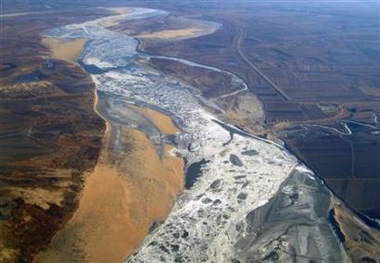|
Thawing ice 'no threat to water supply'
By Li Fangchao (China Daily)
Updated: 2006-01-13 05:48
HARBIN: Water supplies will be unaffected when ice in a river polluted by a
toxic spill thaws in the spring, according to the city's water company.
A chemical plant blast in Jilin City, Northeast China's Jilin Province,
caused a severe chemical leak into the Songhua River in November last year.
Experts from the State Environment Protection Administration (SEPA) estimated
that about 100 tons of benzene and its derivatives poured into the water.

A stretch of
potentially lethal polluted river water headed towards one of China's
biggest cities on Thursday after an explosion at a petrochemical plant,
November 24 2005. [newsphoto] |
Harbin, capital of Northeast China's Heilongjiang Province, which is located
at midstream of the Songhua River, is highly reliant on the river water as its
major water source.
The water supply of the whole city, which has an urban population of about 4
million, was cut off for nearly four days from November 23 to wait for the toxic
slick in the river to flow past the city's water inlet area.
It led to huge economic losses, with many factories suspending their
operations to wait for the resumption of water supplies.
Local residents and business bosses have now raised concerns at the effects
of the river thawing in the spring.
Liu Yurun, manager of the Harbin Water Supply and Discharge Group Co, which
shoulders the responsibility of the city's water supply, said there was no need
for concern.
"Normal water supplies can be ensured this spring and there will be no water
stoppages," he said.
The group will construct a workshop at the site of the city's water inlet,
about 30 kilometres upstream of the urban area of the city, to produce active
carbon to absorb organic pollutants in the river water as a safeguard.
Liu estimated that even if there were some chemical residues released when
the river thawed, the amount would not pose a threat so serious as to force the
company to cut off the city's water inlet.
"Once the chemical level in the river raises when the river begins to thaw in
spring, we will be able to increase the volume of active carbons," he said.
No benzene and nitrobenzene can be detected in the river at present, he said.
The workshop will be established for long-term use to protect the water
source from similar incidents in the future, according to Liu.
Another processing plant to deal with contaminated mud and water, which was
filtrated before the water entered the water plant, will also be built.
Liu said that they are considering baking and then burning the contaminated
mud.
"It is certain that some residues of chemical pollutants were left in the
river, either sticking to the ice, remaining in the water or clinging to mud at
the bottom," Zhai Pingyang, a researcher with the Heilongjiang Environment
Protection Science Research Institute, told China Daily.
Sun Dezhi, deputy director of the Municipal Environment Engineering
Department of Harbin Institute of Technology, said that they were testing how
long the active carbons which were put into the river would last before reaching
saturation point.
They were also looking at how to dispose of those which had already absorbed
pollutants to their maximum limits.
About 1,400 tons of active carbons were released at the water inlet of the
city and the filtration pool of the water processing plant during the four-day
water stoppage after the explosion.
(China Daily 01/13/2006 page3)
|